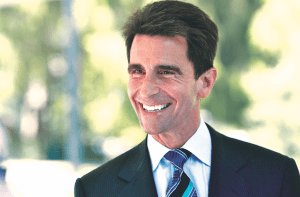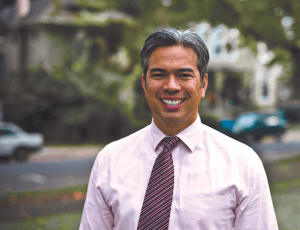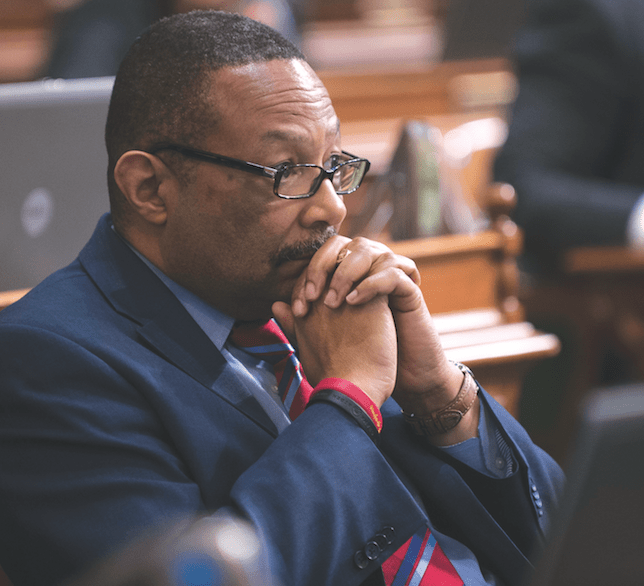Sacramento has a special way of keeping score: votes and dollars. With the November election looming, the state capital is fixated on dollars—especially when it comes to cannabis.
Proposition 64, which if passed by voters Nov. 8 will legalize possession of small amounts of recreational cannabis for Californians age 21 and older, has become the big-interest item among seventeen initiatives and referendums on the statewide ballot.
There’s much competition for voter attention this fall: Two initiatives address the death penalty, and multiple proposed constitutional changes attempt to tackle a range of issues from guns and ammunition to condoms and porn stars.

Heading into October, the money race has been remarkably lopsided. The Yes on Prop. 64 machine collected about $11.8 million by mid-September. The No on Prop. 64 team was struggling to top $464,000 in funding until a series of donations from a Virginia trust controlled by art professor Julie Schauer brought $1.3 million into the “no” camp.
Normally, such unbalanced funding numbers indicate the race is over. The correlation between money and success at the ballot box is taken for granted among Sacramento political pros, though the presumptive wisdom doesn’t always prevail.
In the case of Prop. 64, statewide polling has been consistently positive for the initiative, with about 60 percent of voters indicating they favor passage. But fans of Prop. 64 should not celebrate victory quite yet.
Polls and the race for dollars can present a deceptive picture of what’s really happening in the hearts and minds of voters. While Prop. 64 proponents have reason to feel optimistic about the destiny of their ballot measure, cannabis is exactly the sort of commodity than may defy political presumptions.
While most ballot initiatives and referendums easily adopt familiar talking points in the political forum, cannabis transcends the standard election-cycle debate. It’s not like an infrastructure bond measure or the death penalty, which the vast majority of voters thankfully encounter only in its most philosophical sense.
Cannabis is personal. Millions of Californians are very familiar with the plant, and their perception may not be entirely positive. The product’s ubiquitous nature and controversial history mean most voters will make their Prop. 64 choice based on specific and personal experiences, not the drumbeat of TV commercials, robocalls, direct-mail campaigns and media coverage.
Still, it always helps to have money, and Prop. 64 advocates have the funding to run a first-class campaign. Venture capitalist Sean Parker, who helped establish Facebook, has contributed $2.32 million to the cause, making him the foremost individual supporter of Prop. 64.
But Parker’s financial interests have frightened numerous growers and convinced some industry leaders that the Facebook pioneer is merely the leading edge of a venture capitalist assault on California’s envied crop.
The question of adult-use cannabis has thoroughly captured Sacramento’s political insiders, thanks to the money and players involved. -R.E. Graswich
Parker insists he’s not preparing to enrich himself with the business opportunities recreational cannabis will bring, but the same can’t be said about his friends and associates in Silicon Valley and beyond.
The trio of regulatory bills signed last fall by Gov. Jerry Brown were supported by Democrats, Republicans, cultivators, dispensaries, distributors, law enforcement, labor unions, and many cities and county governments. The story is vastly different with Prop. 64. The initiative has drawn fire along numerous fronts, including from law enforcement, local communities, labor associations, and political leaders.
Advocates for Prop. 64 insist the state is ready for recreational cannabis. They say the current language is a big improvement over past adult-use proposals that failed at the ballot box. The “we got it right this time” argument is the resounding theme from the Yes on Prop. 64 campaign, but it’s a claim vulnerable to attack, and it doesn’t address the half-dozen or so specific complaints cited by opponents.

The No on Prop. 64 campaign has built its arguments around four primary weaknesses with the proposed law: negative impacts on children, saturation in minority neighborhoods and communities, inadequate advertising protocols, and the absence of objective testing and enforcement methods to determine whether drivers are under the influence.
Other grievances have been expressed by legacy and independent growers, who believe Prop. 64 is coming too quickly on the heels of last year’s regulatory breakthroughs, which were nineteen years in creation. They feel the new law favors mega-grow and global retail operations, whose presence in California would dramatically impact the product’s relationship with consumers.
It’s worth remembering that cannabis still scares some people in California, especially older voters who associate marijuana with crime and fail to recognize the difference between licensed and regulated farmers and gun-toting, trespassing drug cartels.
In recent months, around 250 California cities, backed by many county boards of supervisors, have enacted cannabis prohibitions on activities ranging from outdoor cultivation and distribution restrictions to comprehensive bans of all marijuana products.
Even if Prop. 64 passes, those bans won’t be magically brushed aside. California cannabis regulations—both medical and recreational—are founded on the principle of local rule. This means city and county governments will continue to have control over the legal presence of the product in local neighborhoods.
Battle over respect and regulation won’t necessarily end simply because voters approve the measure.

Don’t count us
Prop. 64 has struggled to secure political backing from the state’s leading elected officials. Lt. Gov. Gavin Newsom is the only statewide office-holder to endorse the initiative. Among California’s fifty-three members of Congress, only four have endorsed Prop. 64. Just one of forty state senators, Mark Leno [D-San Francisco], publicly backs Prop. 64. Only seven of eighty state assembly members have signed on, led by cannabis-friendly Rob Bonta [D-Oakland], David Chiu [D-San Francisco] and Reggie Jones-Sawyer [D-Los Angeles].
Legislative holiday
State legislators wrapped up their work for 2016 with a traditional torrent of last-minute negotiations and votes to kill, gut, amend, or send hundreds of bills to Gov. Brown for approval or veto. Only a handful, mostly dealing with regulatory housekeeping matters such as licenses for cottage-size grows, involved cannabis. Lawmakers seemed fatigued by the topic after last year’s wave of regulations, and saw no benefit in pursuing significant cannabis legislation while Prop. 64 was under consideration by voters.











